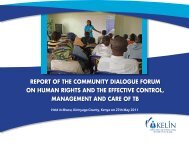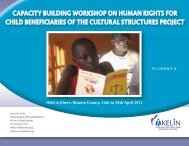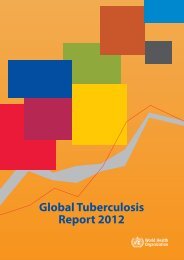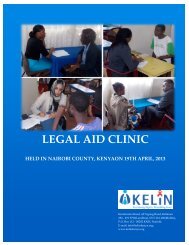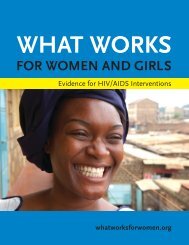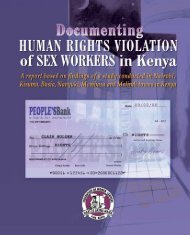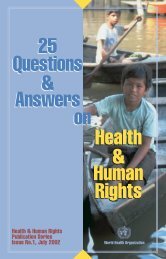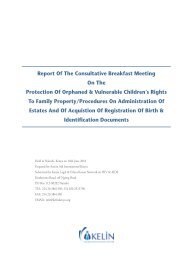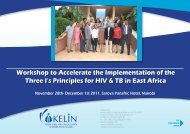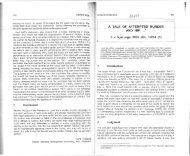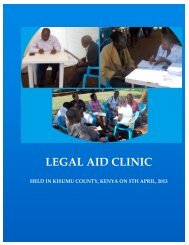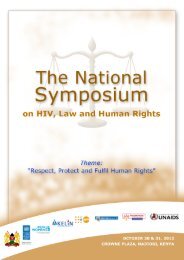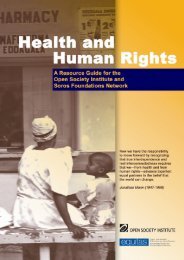seminar for lawyers on hiv law and human rights in kenya - Kelin
seminar for lawyers on hiv law and human rights in kenya - Kelin
seminar for lawyers on hiv law and human rights in kenya - Kelin
You also want an ePaper? Increase the reach of your titles
YUMPU automatically turns print PDFs into web optimized ePapers that Google loves.
SEMINAR FOR LAWYERS ON HIV LAW AND HUMAN RIGHTS<br />
IN KENYA<br />
K<strong>in</strong>daruma Road, off Ng<strong>on</strong>g Road, Kilimani<br />
254 -‐‐ 251 5790 (L<strong>and</strong>l<strong>in</strong>e), 0717 261 408(Mobile),<br />
P.O. Box 112 -‐‐ 00202 KNH, Nairobi,<br />
E-‐‐mail: <strong>in</strong>fo@kel<strong>in</strong><strong>kenya</strong>.org;<br />
www.kel<strong>in</strong><strong>kenya</strong>.org
2<br />
TABLE OF CONTENTS<br />
TABLE OF CONTENTS ......................................................................................................................... 2<br />
ABBREVIATIONS .................................................................................................................................. 3<br />
1.0 BACKGROUND ............................................................................................................................ 4<br />
2.0 EXECUTIVE SUMMARY ............................................................................................................. 6<br />
3.0 TARGET GROUP ........................................................................................................................ 10<br />
4.0 THE WORKSHOP ....................................................................................................................... 10<br />
4.1 Introducti<strong>on</strong> <strong>and</strong> welcome remarks ......................................................................................... 10<br />
4.2 Expectati<strong>on</strong>s ................................................................................................................................ 11<br />
4.3 The Role of the Law as a Mechanism to ensure full enjoyment of HIV-‐‐related <strong>rights</strong> <str<strong>on</strong>g>for</str<strong>on</strong>g><br />
PLHIV ................................................................................................................................................. 11<br />
4.4 Video Screen<strong>in</strong>g .......................................................................................................................... 13<br />
4.5 Overview of HIV <strong>and</strong> Human Rights <strong>and</strong> the Relevant C<strong>on</strong>stituti<strong>on</strong>al Provisi<strong>on</strong>s ......... 14<br />
4.6 HIV & AIDS Equity Tribunal: How Advocates Can Engage It ........................................... 15<br />
4.7 Know your Epidemic, Know your Resp<strong>on</strong>se ......................................................................... 16<br />
4.8 HIV related Human Rights Violati<strong>on</strong>: Testim<strong>on</strong>ies .............................................................. 17<br />
4.9 Legal <strong>and</strong> Ethical Issues Relat<strong>in</strong>g to HIV <strong>and</strong> Provisi<strong>on</strong>s that Address ............................ 18<br />
4.10: PRACTICAL SESSION -‐‐ Debate: Is Crim<strong>in</strong>alizati<strong>on</strong> of deliberate <strong>in</strong>fecti<strong>on</strong> of HIV<br />
useful <str<strong>on</strong>g>for</str<strong>on</strong>g> the reducti<strong>on</strong> of the spread of HIV? ............................................................................ 19<br />
4.11 Legal Support <strong>in</strong> Palliative Care ............................................................................................. 20<br />
4.12 Legislat<strong>in</strong>g <strong>and</strong> Litigat<strong>in</strong>g HIV <strong>in</strong> the Kenyan C<strong>on</strong>text ...................................................... 21<br />
4.13 Video Screen<strong>in</strong>g ........................................................................................................................ 22<br />
4.14 Develop<strong>in</strong>g HIV & AIDS Jurisprudence: Challenges <strong>and</strong> Prospects ................................ 22<br />
5.0 TRAINING METHODOLOGY .................................................................................................. 24<br />
6.0 WAY FORWARD ........................................................................................................................ 24<br />
7.0 CHALLENGES ............................................................................................................................ 25<br />
8.0 RECOMMENDATIONS ............................................................................................................. 25<br />
APPENDIX 1: CALL FOR APPLICATIONS .................................................................................. 26<br />
APPENDIX 2: WORKSHOP PROGRAM ....................................................................................... 29<br />
APPENDIX 3: LIST OF PARTICIPANTS ....................................................................................... 34
3<br />
ADR<br />
CIC<br />
CSR<br />
ABBREVIATIONS<br />
KEHPCA<br />
KANCO<br />
HAPCA<br />
HIV<br />
IDUs<br />
IPRs<br />
OSF<br />
OSIEA<br />
OVCs<br />
MTCT<br />
NEPHAK<br />
PLHIV<br />
TB<br />
NACC<br />
PLHIV<br />
NGO<br />
OVCs<br />
LSK<br />
Alternative Dispute Resoluti<strong>on</strong><br />
Commissi<strong>on</strong> <strong>on</strong> the Implementati<strong>on</strong> of the C<strong>on</strong>stituti<strong>on</strong><br />
Corporate Social Resp<strong>on</strong>sibility<br />
Kenya Hospices <strong>and</strong> Palliative Care Associati<strong>on</strong><br />
Kenya AIDS NGOs C<strong>on</strong>sortium<br />
HIV <strong>and</strong> AIDS Preventi<strong>on</strong> <strong>and</strong> C<strong>on</strong>trol Act<br />
Human immuno-‐‐deficiency virus<br />
Inject<strong>in</strong>g Drug Users<br />
Intellectual Property Rights<br />
Open Society Foundati<strong>on</strong><br />
Open Society Initiative <str<strong>on</strong>g>for</str<strong>on</strong>g> East Africa<br />
Orphans & Vulnerable Children<br />
Mother to Child Transmissi<strong>on</strong><br />
The Nati<strong>on</strong>al Empowerment Network of People Liv<strong>in</strong>g with HIV <strong>and</strong> AIDS <strong>in</strong><br />
Kenya<br />
Pers<strong>on</strong>s Liv<strong>in</strong>g with HIV<br />
Tuberculosis<br />
Nati<strong>on</strong>al AIDS C<strong>on</strong>trol Council<br />
Pers<strong>on</strong>s Liv<strong>in</strong>g with HIV<br />
N<strong>on</strong> Governmental Organizati<strong>on</strong>s<br />
Orphans <strong>and</strong> Vulnerable Children<br />
Law Society of Kenya
4<br />
1.0 BACKGROUND<br />
KELIN recently c<strong>on</strong>ducted a nati<strong>on</strong>al study 1 commissi<strong>on</strong>ed by Kenya AIDS NGOs<br />
C<strong>on</strong>sortium (KANCO) <strong>and</strong> the Nati<strong>on</strong>al AIDS C<strong>on</strong>trol Council (NACC) with technical <strong>and</strong><br />
f<strong>in</strong>ancial support from the UNDP <strong>and</strong> UNAIDS country offices to establish the level of<br />
awareness of <strong>human</strong> <strong>rights</strong> am<strong>on</strong>g Pers<strong>on</strong>s Liv<strong>in</strong>g with HIV (PLHIV), <strong>human</strong> <strong>rights</strong><br />
violati<strong>on</strong>s aga<strong>in</strong>st PLHIV <strong>and</strong> their experiences of discrim<strong>in</strong>ati<strong>on</strong> <strong>on</strong> the basis of their HIV<br />
positive status. One of the key f<strong>in</strong>d<strong>in</strong>gs of this study was high level of <strong>human</strong> <strong>rights</strong> violati<strong>on</strong>s<br />
faced by PLHIV <strong>in</strong> Kenya. The study further dem<strong>on</strong>strated that most of those affected are<br />
unable to access justice due to various factors <strong>in</strong>clud<strong>in</strong>g the lack of funds <str<strong>on</strong>g>for</str<strong>on</strong>g> litigati<strong>on</strong> costs<br />
<strong>and</strong> accessible legal services.<br />
Access to justice is an <strong>on</strong>go<strong>in</strong>g challenge <strong>in</strong> Kenya, as there are <strong>on</strong>ly a few organizati<strong>on</strong>s that<br />
offer free legal aid services <strong>and</strong> even fewer offer<strong>in</strong>g legal services <str<strong>on</strong>g>for</str<strong>on</strong>g> HIV related violati<strong>on</strong>s.<br />
The need to protect <strong>human</strong> <strong>rights</strong> am<strong>on</strong>g key populati<strong>on</strong>s at a higher risk of HIV <strong>and</strong> am<strong>on</strong>g<br />
vulnerable populati<strong>on</strong>s has been identified as crucial <strong>in</strong> the nati<strong>on</strong>al ef<str<strong>on</strong>g>for</str<strong>on</strong>g>ts <strong>on</strong> preventi<strong>on</strong>,<br />
treatment <strong>and</strong> mitigati<strong>on</strong> of the socioec<strong>on</strong>omic impact of HIV. Access to justice is now well<br />
articulated <strong>in</strong> Article 48 of the C<strong>on</strong>stituti<strong>on</strong>. It is also articulated <strong>in</strong> most of the <strong>in</strong>ternati<strong>on</strong>al<br />
<strong>human</strong> <strong>rights</strong> treaties 2 which Kenya has ratified <strong>and</strong> which now <str<strong>on</strong>g>for</str<strong>on</strong>g>m part of the <strong>law</strong>s of<br />
1<br />
file:///C:/Users/saumu%20waziri/AppData/Local/Microsoft/W<strong>in</strong>dows/AppData/Local/Microsoft/AppData/Local/<br />
Microsoft/W<strong>in</strong>dows/Temporary%20Internet%20Files/C<strong>on</strong>tent.Outlook/M7DCC78S/kel<strong>in</strong><strong>kenya</strong>.org/wp-‐‐<br />
c<strong>on</strong>tent/uploads/2010/10/Human-‐‐Violati<strong>on</strong>-‐‐book-‐‐f<strong>in</strong>al.pdf<br />
2<br />
Internati<strong>on</strong>al Covenant <strong>on</strong> Civil & Political Rights (ICCPR), Internati<strong>on</strong>al Covenant <strong>on</strong> Ec<strong>on</strong>omic, Social &<br />
Cultural Rights (ICESR), C<strong>on</strong>venti<strong>on</strong> <strong>on</strong> the Rights of the Child (CRC), C<strong>on</strong>venti<strong>on</strong> <strong>on</strong> Elim<strong>in</strong>ati<strong>on</strong> of all <str<strong>on</strong>g>for</str<strong>on</strong>g>ms of<br />
Discrim<strong>in</strong>ati<strong>on</strong> aga<strong>in</strong>st Women (CEDAW), The African Charter <strong>on</strong> Human <strong>and</strong> Peoples Rights (ACHPR) <strong>and</strong> the<br />
African Charter <strong>on</strong> the Rights <strong>and</strong> Welfare of the Child (ACRWC) am<strong>on</strong>g others.
5<br />
Kenya. This notwithst<strong>and</strong><strong>in</strong>g, access<strong>in</strong>g justice <strong>in</strong> Kenya is very difficult especially <str<strong>on</strong>g>for</str<strong>on</strong>g> the<br />
poor <strong>and</strong> vulnerable who comprise more than 80% of society.<br />
As a result of the <strong>rights</strong> awareness programs by KELIN <strong>and</strong> other organizati<strong>on</strong>s of PLHIV,<br />
<strong>and</strong> the establishment of the Equity Tribunal <strong>in</strong> December 2009, KELIN has addressed over 15<br />
cases from PLWHIV network organizati<strong>on</strong>s relat<strong>in</strong>g to <strong>human</strong> <strong>rights</strong> violati<strong>on</strong>s <strong>in</strong> the c<strong>on</strong>text<br />
of health <strong>and</strong> HIV. The numbers of referrals are expected to <strong>in</strong>crease as KELIN carries out<br />
further tra<strong>in</strong><strong>in</strong>gs <str<strong>on</strong>g>for</str<strong>on</strong>g> PLWHIV network organizati<strong>on</strong>s to enable the identificati<strong>on</strong> of <strong>human</strong><br />
<strong>rights</strong> abuses <strong>and</strong> dem<strong>and</strong> <str<strong>on</strong>g>for</str<strong>on</strong>g> justice.<br />
Participants at the tra<strong>in</strong><strong>in</strong>g referr<strong>in</strong>g to their h<strong>and</strong>outs
6<br />
The tra<strong>in</strong><strong>in</strong>g of practic<strong>in</strong>g legal practiti<strong>on</strong>ers <strong>on</strong> HIV related <strong>human</strong> <strong>rights</strong> issues will facilitate<br />
the availability <strong>and</strong> accessibility of af<str<strong>on</strong>g>for</str<strong>on</strong>g>dable legal services <str<strong>on</strong>g>for</str<strong>on</strong>g> HIV related violati<strong>on</strong>. This<br />
<strong>in</strong>itiative is also aimed at promot<strong>in</strong>g sound jurisprudence <strong>in</strong> decid<strong>in</strong>g cases relat<strong>in</strong>g to HIV<br />
related <strong>human</strong> <strong>rights</strong>.<br />
2.0 EXECUTIVE SUMMARY<br />
KELIN is a <strong>human</strong> <strong>rights</strong> NGO work<strong>in</strong>g to protect <strong>and</strong> promote HIV-‐‐related <strong>human</strong> <strong>rights</strong> <strong>in</strong><br />
Kenya. We do this by: provid<strong>in</strong>g legal services <strong>and</strong> support, tra<strong>in</strong><strong>in</strong>g professi<strong>on</strong>als <strong>on</strong> <strong>human</strong><br />
<strong>rights</strong>, engag<strong>in</strong>g <strong>in</strong> advocacy campaigns that promote awareness of <strong>human</strong> <strong>rights</strong> issues,<br />
c<strong>on</strong>duct<strong>in</strong>g research <strong>and</strong> <strong>in</strong>fluenc<strong>in</strong>g policy that promotes evidence-‐‐based change.<br />
The Law Society of Kenya (LSK) is Kenya’s premier bar associati<strong>on</strong>, with membership of all<br />
practic<strong>in</strong>g advocates, currently number<strong>in</strong>g <strong>in</strong> excess of seven thous<strong>and</strong>. It has the m<strong>and</strong>ate to<br />
advise <strong>and</strong> assist members of the legal professi<strong>on</strong>, the government <strong>and</strong> the larger public <strong>in</strong> all<br />
matters relat<strong>in</strong>g to the adm<strong>in</strong>istrati<strong>on</strong> of justice <strong>in</strong> Kenya.<br />
The Nati<strong>on</strong>al Empowerment Network of People Liv<strong>in</strong>g with HIV <strong>and</strong> AIDS <strong>in</strong> Kenya<br />
(NEPHAK) is an NGO that unites support groups of PLHIV <strong>and</strong> <strong>in</strong>dividual PLHIV <strong>in</strong>to a<br />
nati<strong>on</strong>al <strong>and</strong> <str<strong>on</strong>g>for</str<strong>on</strong>g>midable <str<strong>on</strong>g>for</str<strong>on</strong>g>ce to counter the impact of HIV <strong>and</strong> AIDS <strong>on</strong> their lives <strong>and</strong> that<br />
of their loved <strong>on</strong>es <strong>in</strong> Kenya.<br />
KELIN, <strong>in</strong> partnership with LSK <strong>and</strong> NEPHAK, collaborated to deliver a workshop <str<strong>on</strong>g>for</str<strong>on</strong>g><br />
advocates <strong>on</strong> HIV <strong>and</strong> the <strong>law</strong>. Funded by the Open Society Foundati<strong>on</strong> (OSF), the <str<strong>on</strong>g>sem<strong>in</strong>ar</str<strong>on</strong>g><br />
sought to develop a critical underst<strong>and</strong><strong>in</strong>g am<strong>on</strong>g legal practiti<strong>on</strong>ers <strong>on</strong> HIV <strong>law</strong> <strong>and</strong> related<br />
<strong>human</strong> <strong>rights</strong> <strong>in</strong> order to <strong>in</strong>fluence <strong>in</strong>crease <strong>in</strong> legal services <str<strong>on</strong>g>for</str<strong>on</strong>g> HIV related violati<strong>on</strong>s <strong>and</strong><br />
<strong>in</strong>fluence sound case <strong>law</strong> <strong>on</strong> this issue <strong>in</strong> Kenya.<br />
The three days workshop was held from the 21 st to the 23 rd November 2012 at the Panafric<br />
hotel, Nairobi. The ma<strong>in</strong> objectives of the workshop were to:
7<br />
i. Share <strong>in</strong><str<strong>on</strong>g>for</str<strong>on</strong>g>mati<strong>on</strong> <strong>and</strong> knowledge <strong>on</strong> the basics of HIV, <strong>human</strong> <strong>rights</strong> c<strong>on</strong>cepts <strong>and</strong> the<br />
l<strong>in</strong>k between <strong>human</strong> <strong>rights</strong> <strong>and</strong> HIV<br />
ii. Develop critical underst<strong>and</strong><strong>in</strong>g of various challenges raised by legal <strong>and</strong> ethical issues<br />
<strong>in</strong> HIV<br />
iii. Promote comprehensive <strong>rights</strong> based knowledge <strong>on</strong> HIV related <strong>rights</strong> to <strong>in</strong>fluence<br />
<strong>in</strong>creased legal services<br />
iv. Discuss the legal provisi<strong>on</strong>s protect<strong>in</strong>g the <strong>rights</strong> of PLHIVs <strong>and</strong> the available redress<br />
mechanisms<br />
v. Discuss the role of <str<strong>on</strong>g><strong>law</strong>yers</str<strong>on</strong>g> <strong>in</strong> uphold<strong>in</strong>g the <strong>rights</strong> of PLHIVs <strong>and</strong> the <strong>rights</strong> of pers<strong>on</strong>s<br />
affected by HIV<br />
KELIN executed the workshop through presentati<strong>on</strong>s by experts, testim<strong>on</strong>y of a PLHIV,<br />
video sessi<strong>on</strong>s, recap sessi<strong>on</strong>s, a debate <str<strong>on</strong>g>for</str<strong>on</strong>g>um, participatory dialogues, materials provided <strong>in</strong><br />
soft copy <str<strong>on</strong>g>for</str<strong>on</strong>g> the advocates <strong>on</strong> flash disks, <strong>and</strong> various booklets, reports <strong>and</strong> case studies<br />
given to the advocates <strong>in</strong> hard copy.<br />
Besides Allan Maleche <strong>and</strong> Melba Kat<strong>in</strong>di of KELIN, the facilitators drew from a wide range<br />
of experts <strong>in</strong> the field. They <strong>in</strong>cluded:<br />
Ambrose Rachier; an advocate of the High Court of Kenya with over 30 years<br />
st<strong>and</strong><strong>in</strong>g, lecturer, writer, chair of the Kenya AIDS Society. He is the chair of the<br />
KELIN board <strong>and</strong> the outgo<strong>in</strong>g chair of the HIV tribunal after champi<strong>on</strong><strong>in</strong>g the<br />
development of the <strong>law</strong> <strong>on</strong> HIV <strong>in</strong> KENYA. He has stood up as a sound professi<strong>on</strong>al,<br />
courageous pers<strong>on</strong> widely known <str<strong>on</strong>g>for</str<strong>on</strong>g> his profoundly recognized work <strong>on</strong> <strong>human</strong><br />
<strong>rights</strong> <str<strong>on</strong>g>for</str<strong>on</strong>g> People Liv<strong>in</strong>g with HIV (PLHIV).<br />
Cather<strong>in</strong>e Mumma; a member of the Commissi<strong>on</strong> <strong>on</strong> the Implementati<strong>on</strong> of the<br />
C<strong>on</strong>stituti<strong>on</strong> of Kenya, a board member of KELIN <strong>and</strong> an expert <strong>in</strong> <strong>human</strong> <strong>rights</strong>,<br />
gender ma<strong>in</strong>stream<strong>in</strong>g, children’s <strong>rights</strong>, <strong>rights</strong> of pers<strong>on</strong>s with disability <strong>and</strong> HIV <strong>and</strong><br />
AIDS.
8<br />
Otiende Amollo; a practic<strong>in</strong>g advocate of the High court of Kenya of over 15 years<br />
st<strong>and</strong><strong>in</strong>g, a notary public, a commissi<strong>on</strong>er <str<strong>on</strong>g>for</str<strong>on</strong>g> oaths <strong>and</strong> a certified public secretary.<br />
Also a KELIN board member, he has served as an official of the Internati<strong>on</strong>al<br />
Commissi<strong>on</strong> of Jurists Kenya Secti<strong>on</strong>, East African Law Society <strong>and</strong> the Law Society of<br />
Kenya.<br />
Anne Gathumbi; a program manager with Open Society Initiative of East Africa (OSIEA) <strong>and</strong><br />
the Open Society Law <strong>and</strong> Health Initiative, with more than 13 years’ experience work<strong>in</strong>g <strong>on</strong><br />
justice <strong>and</strong> women’s <strong>human</strong> <strong>rights</strong> issues <strong>in</strong> East Africa.<br />
Ms. Anne Gathumbi mak<strong>in</strong>g her presentati<strong>on</strong> at the tra<strong>in</strong><strong>in</strong>g<br />
Nels<strong>on</strong> Otwoma; is the Executive Director of Network of Pers<strong>on</strong>s Liv<strong>in</strong>g with<br />
HIV&AIDS <strong>in</strong> Kenya <strong>and</strong> the community representative <strong>on</strong> the UNITAID Executive<br />
board.<br />
Joy Asiema; a member of the HIV tribunal who is an advocate of the high court of<br />
Kenya <strong>and</strong> a lecturer at the Law School at the University of Nairobi.
9<br />
JothamArwa; a practic<strong>in</strong>g advocate of the High court of Kenya <strong>and</strong> currently a Ph.D.<br />
c<strong>and</strong>idate <strong>in</strong> Law, is also a board member of KELIN. In additi<strong>on</strong> to the practice of <strong>law</strong>,<br />
he has been a lecturer at the Kenya School of Law <strong>and</strong> has specialized <strong>in</strong> Internati<strong>on</strong>al<br />
Commercial <strong>and</strong> Trade Law, Public F<strong>in</strong>ance <strong>and</strong> F<strong>in</strong>ancial Services Law, Corporate<br />
<strong>law</strong>, Human Rights <strong>and</strong> Legislative Draft<strong>in</strong>g.<br />
Dr. Zipporah Ali; she is the executive director of Kenya Hospices <strong>and</strong> Palliative Care<br />
Associati<strong>on</strong> (KEHPCA), the nati<strong>on</strong>al umbrella body <str<strong>on</strong>g>for</str<strong>on</strong>g> hospices <strong>and</strong> palliative care.<br />
Dr. Ali is a board member of the Internati<strong>on</strong>al Hospice <strong>and</strong> Palliative Care Associati<strong>on</strong><br />
(IAHPC). She was am<strong>on</strong>g several others who received the African Palliative Care<br />
Associati<strong>on</strong> (APCA) award <str<strong>on</strong>g>for</str<strong>on</strong>g> her c<strong>on</strong>tributi<strong>on</strong> to palliative care <strong>in</strong> Africa <strong>and</strong> her<br />
work <strong>on</strong> the <strong>in</strong>augural board of APCA.<br />
N<strong>in</strong>eteen advocates attended the entire workshop. Dur<strong>in</strong>g the tra<strong>in</strong><strong>in</strong>g sessi<strong>on</strong>s the advocates<br />
engaged the facilitators through questi<strong>on</strong>s <strong>and</strong> comments. There was also a debate sessi<strong>on</strong> <strong>on</strong><br />
day two of the workshop <strong>in</strong> which the advocates were divided <strong>in</strong>to two teams to debate the<br />
pros <strong>and</strong> c<strong>on</strong>s of crim<strong>in</strong>alizati<strong>on</strong> of deliberate transmissi<strong>on</strong> of HIV. This sessi<strong>on</strong> elicited a lot<br />
of c<strong>on</strong>troversy <strong>and</strong> there was no agreement as to whether crim<strong>in</strong>alizati<strong>on</strong> was a good <strong>law</strong> or<br />
not.<br />
A few advocates shared their experiences h<strong>and</strong>l<strong>in</strong>g HIV-‐‐related cases <strong>and</strong> how they had been<br />
ill-‐‐prepared to go about them. Others c<strong>on</strong>fessed to hav<strong>in</strong>g had stigma aga<strong>in</strong>st HIV related<br />
cases be<str<strong>on</strong>g>for</str<strong>on</strong>g>e the tra<strong>in</strong><strong>in</strong>g. At the end of the tra<strong>in</strong><strong>in</strong>g, the participants commended KELIN <str<strong>on</strong>g>for</str<strong>on</strong>g><br />
open<strong>in</strong>g their eyes to opportunities of advocat<strong>in</strong>g <strong>and</strong> litigat<strong>in</strong>g <strong>in</strong> HIV <strong>rights</strong>. Most of them<br />
had previously known very little <strong>on</strong> HIV-‐‐related <strong>rights</strong> <strong>and</strong> issues.<br />
The tra<strong>in</strong><strong>in</strong>g ended with the advocates committ<strong>in</strong>g to partner<strong>in</strong>g with KELIN <strong>in</strong> the provisi<strong>on</strong><br />
of pro b<strong>on</strong>o services <strong>in</strong> the follow<strong>in</strong>g areas: litigati<strong>on</strong>, legal aid cl<strong>in</strong>ics, legal advice, legal<br />
research <strong>and</strong> writ<strong>in</strong>g.
10<br />
3.0 TARGET GROUP<br />
The target group was practic<strong>in</strong>g advocates from civil society, <strong>in</strong> private practice <strong>and</strong> those<br />
work<strong>in</strong>g with the government, drawn from Nairobi <strong>and</strong> its envir<strong>on</strong>s; Nakuru, Embu <strong>and</strong><br />
Kakamega. A call <str<strong>on</strong>g>for</str<strong>on</strong>g> applicati<strong>on</strong>s was advertised by the Law Society of Kenya am<strong>on</strong>g its<br />
members. KELIN received an overwhelm<strong>in</strong>g number of applicati<strong>on</strong>s. There was also <strong>in</strong>terest<br />
from advocates outside of the target area <strong>and</strong> even a few <strong>in</strong>ternati<strong>on</strong>al applicants. The criteria<br />
<str<strong>on</strong>g>for</str<strong>on</strong>g> selecti<strong>on</strong> was as <strong>in</strong>dicated <strong>in</strong> the call <str<strong>on</strong>g>for</str<strong>on</strong>g> applicati<strong>on</strong>s 3 .<br />
Twenty participants were selected <str<strong>on</strong>g>for</str<strong>on</strong>g> the workshop, n<strong>in</strong>eteen attended; 10 female <strong>and</strong> 9 male<br />
participants 4 .<br />
4.0 THE WORKSHOP<br />
4.1 Introducti<strong>on</strong> <strong>and</strong> welcome remarks<br />
Allan Maleche welcomed the participants. There was a brief <strong>in</strong>troductory sessi<strong>on</strong> where the<br />
participants stated their names, where they work <strong>and</strong> their expectati<strong>on</strong>s <str<strong>on</strong>g>for</str<strong>on</strong>g> the tra<strong>in</strong><strong>in</strong>g.<br />
Welcome remarks were delivered by Anne Gathumbi of OSIEA. She noted that the issues <strong>on</strong><br />
the <strong>law</strong> <strong>and</strong> HIV were diverse <strong>and</strong> challeng<strong>in</strong>g <strong>and</strong> highlighted the follow<strong>in</strong>g as possible<br />
areas the participants could get <strong>in</strong>volved:<br />
- Strict implementati<strong>on</strong> of Intellectual Property Rights (IPRs) of pharmaceutical<br />
companies sometimes compromise access to af<str<strong>on</strong>g>for</str<strong>on</strong>g>dable generic drugs <strong>in</strong> develop<strong>in</strong>g<br />
countries especially <str<strong>on</strong>g>for</str<strong>on</strong>g> the much needed life sav<strong>in</strong>g drugs <str<strong>on</strong>g>for</str<strong>on</strong>g> PLHIV<br />
- Advocacy <str<strong>on</strong>g>for</str<strong>on</strong>g> provisi<strong>on</strong> of clean needles to Inject<strong>in</strong>g Drug Users (IDUs) <strong>and</strong> c<strong>on</strong>doms<br />
<strong>and</strong> lubricants <str<strong>on</strong>g>for</str<strong>on</strong>g> male <strong>and</strong> female sex workers respectively presents the risk of be<strong>in</strong>g<br />
accused of abett<strong>in</strong>g a crime. How can we effect the right to health <str<strong>on</strong>g>for</str<strong>on</strong>g> these groups <strong>in</strong><br />
view of exist<strong>in</strong>g hostile legal envir<strong>on</strong>ment<br />
- Incarcerati<strong>on</strong> of TB drug defaulters <strong>in</strong> pris<strong>on</strong>s without access to <strong>in</strong><str<strong>on</strong>g>for</str<strong>on</strong>g>mati<strong>on</strong>, proper<br />
treatment, balanced diet due to lack of appropriate isolati<strong>on</strong> facilities <strong>in</strong> hospital<br />
3 See APPENDIX 1 Call <str<strong>on</strong>g>for</str<strong>on</strong>g> applicati<strong>on</strong>s<br />
4 See APPENDIX 3 List of participants
11<br />
- Access to c<strong>on</strong>trolled substances to manage pa<strong>in</strong> <str<strong>on</strong>g>for</str<strong>on</strong>g> life limit<strong>in</strong>g c<strong>on</strong>diti<strong>on</strong>s such as<br />
cancers are <strong>in</strong>hibited by str<strong>in</strong>gent anti-‐‐drug <strong>law</strong>s <strong>and</strong> policies<br />
- The offence of deliberate transmissi<strong>on</strong> of HIV <strong>and</strong> its impact <strong>on</strong> PLHIV; could the<br />
participants defend pers<strong>on</strong>s accused of this crime<br />
- Lack of recogniti<strong>on</strong> <strong>and</strong> respect of <strong>human</strong> <strong>rights</strong> of sexual m<strong>in</strong>orities that result <strong>in</strong><br />
numerous <strong>human</strong> <strong>rights</strong> violati<strong>on</strong>s<br />
4.2 Expectati<strong>on</strong>s<br />
The follow<strong>in</strong>g were the expectati<strong>on</strong>s of the advocates at the beg<strong>in</strong>n<strong>in</strong>g of the tra<strong>in</strong><strong>in</strong>g<br />
workshop:<br />
- To learn more about policies <strong>on</strong> HIV <strong>and</strong> their implementati<strong>on</strong><br />
- To learn more about HIV <strong>and</strong> the <strong>law</strong><br />
- To learn about HIV <strong>and</strong> the <strong>law</strong> with a special focus <strong>on</strong> women<br />
- To learn how to represent Kenyans <strong>in</strong> judicial <str<strong>on</strong>g>for</str<strong>on</strong>g>a <strong>on</strong> HIV issues<br />
- To use the experience of the tra<strong>in</strong><strong>in</strong>g to help women<br />
- To be able to apply HIV <strong>law</strong><br />
- To see if litigati<strong>on</strong> has had any impact <strong>on</strong> protecti<strong>on</strong> of HIV <strong>rights</strong> <strong>and</strong> to see how<br />
better litigati<strong>on</strong> can have impact<br />
- To be able to create awareness <strong>on</strong> HIV <strong>rights</strong> <strong>in</strong> the legal sector<br />
4.3 The Role of the Law as a Mechanism to ensure full enjoyment of HIV-‐‐related<br />
<strong>rights</strong> <str<strong>on</strong>g>for</str<strong>on</strong>g> PLHIV<br />
Presenter: Allan Maleche<br />
The objective of the sessi<strong>on</strong> was ma<strong>in</strong>ly to highlight some issues that l<strong>in</strong>k the <strong>law</strong> <strong>and</strong> HIV.<br />
The highlight of this presentati<strong>on</strong> was when the participants were taken through statistics<br />
that <strong>in</strong>dicate that <strong>on</strong>ly 13% of funds <str<strong>on</strong>g>for</str<strong>on</strong>g> HIV programmes are provided by the government.<br />
The difference of 87% comes from d<strong>on</strong>or fund<strong>in</strong>g. The questi<strong>on</strong> “what will happen to pers<strong>on</strong>s<br />
<strong>on</strong> ARV therapy the day d<strong>on</strong>ors pull out” was posed to the participants. In light of the new<br />
c<strong>on</strong>stituti<strong>on</strong> which obliges the government to progressively realize socio-‐‐ec<strong>on</strong>omic <strong>rights</strong> (the
12<br />
right to health is <strong>on</strong>e such right), the participants were urged to use this c<strong>on</strong>stituti<strong>on</strong>al<br />
provisi<strong>on</strong> to advocate <str<strong>on</strong>g>for</str<strong>on</strong>g> <strong>in</strong>creased HIV fund<strong>in</strong>g by the government.<br />
Plenary:<br />
Mr. Allan Maleche lead<strong>in</strong>g discussi<strong>on</strong>s <strong>on</strong> the role of the <strong>law</strong><br />
A questi<strong>on</strong> as to why African countries such as Kenya, Nigeria <strong>and</strong> South Africa have<br />
such a high HIV burden compared to western countries that are deemed to have liberal<br />
morals was asked. Here, the participants were warned of the danger of stigma that<br />
lurks <strong>in</strong> l<strong>in</strong>k<strong>in</strong>g HIV transmissi<strong>on</strong> to issues of morality. It was emphasized that a<br />
<strong>rights</strong>-‐‐based approach required del<strong>in</strong>k<strong>in</strong>g of the two.<br />
The questi<strong>on</strong> of availability of home-‐‐based test kits <strong>and</strong> if these could reduce the<br />
transmissi<strong>on</strong> of HIV was explored. It was po<strong>in</strong>ted out that the availability of these kits<br />
could aggravate domestic c<strong>on</strong>flict where a spouse sneaks <strong>and</strong> tests the other while<br />
asleep.
13<br />
4.4 Video Screen<strong>in</strong>g<br />
This sessi<strong>on</strong> was followed by a video sessi<strong>on</strong> where a documentary <strong>on</strong> <str<strong>on</strong>g>for</str<strong>on</strong>g>ced sterilizati<strong>on</strong> of<br />
HIV positive women <strong>and</strong> another <strong>on</strong> impris<strong>on</strong>ment of TB patients <str<strong>on</strong>g>for</str<strong>on</strong>g> default<strong>in</strong>g <strong>on</strong> tak<strong>in</strong>g<br />
their drugs were played.<br />
Screen<strong>in</strong>g of the documentary, robbed of choice at the tra<strong>in</strong><strong>in</strong>g<br />
Participants noted that:<br />
- Gett<strong>in</strong>g material evidence aga<strong>in</strong>st doctors who engaged <strong>in</strong> <str<strong>on</strong>g>for</str<strong>on</strong>g>ced sterilizati<strong>on</strong> <strong>and</strong><br />
other emerg<strong>in</strong>g issues such as misdiagnosis <strong>and</strong> negligence was a big challenge <strong>in</strong><br />
Kenya. A suggesti<strong>on</strong> was made that KELIN to engage doctors <strong>and</strong> build their <strong>in</strong>terest<br />
<strong>in</strong> promot<strong>in</strong>g <strong>human</strong> <strong>rights</strong> so that obta<strong>in</strong><strong>in</strong>g medical evidence <str<strong>on</strong>g>for</str<strong>on</strong>g> such cases would be<br />
easier.
14<br />
- There was a c<strong>on</strong>flict between advocacy <str<strong>on</strong>g>for</str<strong>on</strong>g> n<strong>on</strong>-‐‐<strong>in</strong>carcerati<strong>on</strong> of TB drug defaulters <strong>and</strong><br />
the greater public <strong>in</strong>terest of protect<strong>in</strong>g society from <strong>in</strong>fecti<strong>on</strong>. The need <str<strong>on</strong>g>for</str<strong>on</strong>g> a <strong>rights</strong>-‐based<br />
approach was emphasized <strong>and</strong> it was stressed that <strong>in</strong>carcerati<strong>on</strong> of TB drug<br />
defaulters with other <strong>in</strong>mates <strong>and</strong> without access to medical treatment <strong>and</strong> proper diet<br />
was not justifiable <strong>on</strong> grounds of public <strong>in</strong>terest. The government needs to be held<br />
accountable <strong>in</strong> ensur<strong>in</strong>g isolati<strong>on</strong> wards are available <strong>in</strong> TB high risk areas.<br />
4.5 Overview of HIV <strong>and</strong> Human Rights <strong>and</strong> the Relevant C<strong>on</strong>stituti<strong>on</strong>al Provisi<strong>on</strong>s<br />
Presenter: Commissi<strong>on</strong>er Cather<strong>in</strong>e Mumma<br />
The overall objective of this sessi<strong>on</strong> was to l<strong>in</strong>k HIV issues with <strong>human</strong> <strong>rights</strong>. It was<br />
highlighted that HIV first beg<strong>in</strong>s with socio-‐‐cultural <strong>and</strong> ec<strong>on</strong>omic factors. The medical aspect<br />
of it comes <strong>in</strong> <strong>on</strong>ly later with regard to treatment <strong>and</strong> transmissi<strong>on</strong>.<br />
Commissi<strong>on</strong>er Cather<strong>in</strong>e Mumma lead<strong>in</strong>g discussi<strong>on</strong>s<br />
The social issues with regard to stigma, discrim<strong>in</strong>ati<strong>on</strong> <strong>in</strong> the work place, poverty, child<br />
marriages <strong>and</strong> wife <strong>in</strong>heritance l<strong>in</strong>k HIV to <strong>human</strong> <strong>rights</strong>. The participants were taken<br />
through c<strong>on</strong>stituti<strong>on</strong>al provisi<strong>on</strong>s with a bear<strong>in</strong>g to HIV issues. As part of their resp<strong>on</strong>sibility<br />
<strong>on</strong> HIV issues, the participants were asked to:
15<br />
- Audit <strong>law</strong>s <strong>and</strong> policies through various <str<strong>on</strong>g>for</str<strong>on</strong>g>ums such as the CIC process <strong>and</strong> the LSK<br />
committees<br />
- Influence review of exist<strong>in</strong>g <strong>law</strong>s to align them with the c<strong>on</strong>stituti<strong>on</strong><br />
Dem<strong>and</strong> <str<strong>on</strong>g>for</str<strong>on</strong>g> implementati<strong>on</strong> of <strong>law</strong>s through quality public <strong>in</strong>terest litigati<strong>on</strong><br />
- Provide legal aid as a CSR of their <strong>law</strong> firms<br />
- Collaborate with health practiti<strong>on</strong>ers <strong>and</strong> have sessi<strong>on</strong>s where <str<strong>on</strong>g><strong>law</strong>yers</str<strong>on</strong>g> <strong>and</strong> doctors<br />
work together<br />
- Learn the <strong>rights</strong>-‐‐based approach to service delivery <strong>and</strong> practice it<br />
KELIN was asked to develop a mail<strong>in</strong>g list <str<strong>on</strong>g>for</str<strong>on</strong>g> the participants to facilitate shar<strong>in</strong>g of<br />
<strong>in</strong><str<strong>on</strong>g>for</str<strong>on</strong>g>mati<strong>on</strong> <str<strong>on</strong>g>for</str<strong>on</strong>g> quality public <strong>in</strong>terest litigati<strong>on</strong>.<br />
Plenary:<br />
In l<strong>in</strong>e with the c<strong>on</strong>stituti<strong>on</strong> oblig<strong>in</strong>g the government to progressively realize socio-‐ec<strong>on</strong>omic<br />
<strong>rights</strong>, participants wanted to know how <strong>on</strong>e could tell that the government<br />
is progressively realiz<strong>in</strong>g these <strong>rights</strong>. It was expla<strong>in</strong>ed that progressive realizati<strong>on</strong> of<br />
socio-‐‐ec<strong>on</strong>omic <strong>rights</strong> is measurable. Participants could ask the government to def<strong>in</strong>e<br />
m<strong>in</strong>imum atta<strong>in</strong>able units of a right <strong>and</strong> to dem<strong>on</strong>strate realizati<strong>on</strong> us<strong>in</strong>g statistics.<br />
Questi<strong>on</strong>s were raised <strong>in</strong> light of Article 2(6) of the c<strong>on</strong>stituti<strong>on</strong>, which moves Kenya<br />
from a m<strong>on</strong>ist state to a dualist state. Participants wanted to know which <strong>law</strong> takes<br />
precedence <strong>in</strong> case of a c<strong>on</strong>flict between domestic legislati<strong>on</strong> <strong>and</strong> <strong>in</strong>ternati<strong>on</strong>al treaties.<br />
Article 10 of the c<strong>on</strong>stituti<strong>on</strong> <strong>on</strong> nati<strong>on</strong>al values <strong>and</strong> pr<strong>in</strong>ciples was brought to the<br />
attenti<strong>on</strong> of the participants as be<strong>in</strong>g capable of unlock<strong>in</strong>g such a deadlock.<br />
4.6 HIV & AIDS Equity Tribunal: How Advocates Can Engage It<br />
Presenter: Joy Asiema<br />
The highlight of this sessi<strong>on</strong> was the elucidati<strong>on</strong> of advantages of choos<strong>in</strong>g the HIV Equity<br />
tribunal over other <str<strong>on</strong>g>for</str<strong>on</strong>g>ums: it seeks to adjudicate cases with a <strong>human</strong>e touch. The hear<strong>in</strong>gs are<br />
<strong>in</strong> camera <strong>and</strong> there is a level of <strong>in</strong><str<strong>on</strong>g>for</str<strong>on</strong>g>mality allowed <strong>in</strong> present<strong>in</strong>g <strong>on</strong>e’s case which could<br />
hasten dispensati<strong>on</strong> of justice <str<strong>on</strong>g>for</str<strong>on</strong>g> PLHIV. KELIN was commended <str<strong>on</strong>g>for</str<strong>on</strong>g> partner<strong>in</strong>g with the
16<br />
tribunal <strong>in</strong> cases which have other issues attached to them besides HIV stigma <strong>and</strong><br />
discrim<strong>in</strong>ati<strong>on</strong>, such as cases that require Alternative Dispute Resoluti<strong>on</strong> (ADR).<br />
Ms. Joy Osiema deliberat<strong>in</strong>g <strong>on</strong> how advocates can engage the HIV Tribunal<br />
KELIN was also urged to c<strong>on</strong>vene another workshop <strong>and</strong> <strong>in</strong>vite other members of the<br />
tribunal: to discuss <strong>on</strong> how to file a case at the tribunal <strong>and</strong> medical-‐‐legal issues relat<strong>in</strong>g to<br />
HIV.<br />
Plenary:<br />
Participants w<strong>on</strong>dered why the tribunal has no jurisdicti<strong>on</strong> to deal withcases of HIV<br />
stigma <strong>and</strong> discrim<strong>in</strong>ati<strong>on</strong> that arose be<str<strong>on</strong>g>for</str<strong>on</strong>g>e commencement of the HAPCA. They were<br />
challenged to take this matter up <strong>in</strong> public <strong>in</strong>terest litigati<strong>on</strong> <strong>in</strong> light of Article 27(4) of<br />
the c<strong>on</strong>stituti<strong>on</strong>.<br />
4.7 Know your Epidemic, Know your Resp<strong>on</strong>se<br />
Presenter: Nels<strong>on</strong> Otwoma<br />
In this sessi<strong>on</strong> participants were taken through issues of access to treatment <strong>and</strong> it was<br />
emphasized that to encourage HIV test<strong>in</strong>g, people needed to be assured of support <strong>and</strong>
17<br />
treatment follow<strong>in</strong>g positive test results. If harsh repercussi<strong>on</strong>s of stigma <strong>and</strong> discrim<strong>in</strong>ati<strong>on</strong><br />
were associated with HIV test<strong>in</strong>g, few people would be will<strong>in</strong>g to get tested. The current<br />
policy of HIV test<strong>in</strong>g <str<strong>on</strong>g>for</str<strong>on</strong>g> expectant women <strong>and</strong> pers<strong>on</strong>s present<strong>in</strong>g symptoms of TB was<br />
brought to the attenti<strong>on</strong> of the participants. There was need to make them aware that though<br />
the <str<strong>on</strong>g>for</str<strong>on</strong>g>ego<strong>in</strong>g raises issues of c<strong>on</strong>sent, privacy <strong>and</strong> c<strong>on</strong>fidentiality, <strong>on</strong>e could not have legal<br />
recourse aga<strong>in</strong>st health practiti<strong>on</strong>ers <strong>in</strong> such cases because of public policy protecti<strong>on</strong><br />
available to them.<br />
Test<strong>in</strong>g <str<strong>on</strong>g>for</str<strong>on</strong>g> children <strong>on</strong>ly with the c<strong>on</strong>sent of their legal guardians as stipulated <strong>in</strong> the HIV<br />
<strong>and</strong> AIDS Preventi<strong>on</strong> <strong>and</strong> C<strong>on</strong>trol Act (HAPCA) was also raised as an issue of c<strong>on</strong>cern <strong>in</strong> HIV<br />
management. It was noted that <strong>in</strong> most family sett<strong>in</strong>gs <strong>in</strong> Kenya OVCs are not legally adopted<br />
<strong>on</strong>ce their parents pass away, hence there is need <str<strong>on</strong>g>for</str<strong>on</strong>g> <strong>law</strong> re<str<strong>on</strong>g>for</str<strong>on</strong>g>m to take cognizance of this<br />
fact.<br />
4.8 HIV related Human Rights Violati<strong>on</strong>: Testim<strong>on</strong>ies<br />
This sessi<strong>on</strong> was followed by a testim<strong>on</strong>y sessi<strong>on</strong> by PLHIV. Here, the participants were<br />
given <strong>in</strong>sight <strong>in</strong>to the challenges faced by HIV positive women. Issues of societal stigma <str<strong>on</strong>g>for</str<strong>on</strong>g><br />
HIV positive women express<strong>in</strong>g their sexuality came out. The witness testified as to how her<br />
doctor expressed surprise at her pregnancy because of her HIV status <strong>and</strong> advised her to<br />
undergo sterilizati<strong>on</strong> after delivery. She testified of experiences of HIV positive women be<strong>in</strong>g<br />
taken through guilt trips by health practiti<strong>on</strong>ers to coerce them <strong>in</strong>to c<strong>on</strong>sent<strong>in</strong>g to<br />
sterilizati<strong>on</strong>. Some health workers have even asked them brutal questi<strong>on</strong>s such as “you mean<br />
you still have sex even after you got HIV?”<br />
The sessi<strong>on</strong> <strong>in</strong>troduced the participants to key populati<strong>on</strong>s as potential clients, us<strong>in</strong>g an<br />
<strong>in</strong><str<strong>on</strong>g>for</str<strong>on</strong>g>mal values clarificati<strong>on</strong> sessi<strong>on</strong>. Participants were able to explore their pers<strong>on</strong>al<br />
prejudices <strong>and</strong> reflect <strong>on</strong> how this would impact their will<strong>in</strong>gness to represent <strong>and</strong> work with<br />
these groups.
18<br />
Plenary:<br />
A questi<strong>on</strong> was posed as to the feasibility of us<strong>in</strong>g treatment as preventi<strong>on</strong> to curb the<br />
spread of HIV. It was brought to the attenti<strong>on</strong> of the participants that such a<br />
programme has not been rolled out yet <strong>in</strong> Kenya <strong>and</strong> is an issue <str<strong>on</strong>g>for</str<strong>on</strong>g> advocacy as<br />
research <strong>in</strong>dicates that the programme can significantly reduce chances of HIV<br />
transmissi<strong>on</strong>.<br />
4.9 Legal <strong>and</strong> Ethical Issues Relat<strong>in</strong>g to HIV <strong>and</strong> Provisi<strong>on</strong>s that Address<br />
Ambrose Rachier<br />
The objective of this sessi<strong>on</strong> was to take the participants through the history of the virus, the<br />
evoluti<strong>on</strong> of policy, <strong>law</strong> <strong>and</strong> ethics <strong>on</strong> the same. Participants were given <strong>in</strong>sights <strong>in</strong>to the early<br />
resp<strong>on</strong>ses to the discovery of the virus <strong>in</strong> African countries. There was general denial of the<br />
existence of the virus <strong>and</strong> the impact that it could have which h<strong>in</strong>dered development of policy<br />
<strong>and</strong> legal resp<strong>on</strong>se. Participants were referred to read the 1997 August <strong>and</strong> September<br />
Hansards <strong>on</strong> parliamentary debates <strong>on</strong> HIV to assess how much ignorance existed am<strong>on</strong>g the<br />
top leadership <strong>on</strong> HIV issues.<br />
The presenter then discussed issues of c<strong>on</strong>sent, privacy <strong>and</strong> c<strong>on</strong>fidentiality us<strong>in</strong>g numerous<br />
case examples. The participants were also <strong>in</strong><str<strong>on</strong>g>for</str<strong>on</strong>g>med of ef<str<strong>on</strong>g>for</str<strong>on</strong>g>ts at balanc<strong>in</strong>g the right to<br />
c<strong>on</strong>fidentiality with the right to disclose test results to third parties at risk of <strong>in</strong>fecti<strong>on</strong>. This<br />
method has been used by hospitals <strong>in</strong> Kericho where by pers<strong>on</strong>s who test HIV positive are<br />
scheduled <str<strong>on</strong>g>for</str<strong>on</strong>g> another appo<strong>in</strong>tment with the hospital <strong>and</strong> are encouraged to come with their<br />
sexual partners. A counsel<strong>in</strong>g sessi<strong>on</strong> is then arranged <str<strong>on</strong>g>for</str<strong>on</strong>g> the partners <strong>in</strong> which the health<br />
practiti<strong>on</strong>er reveals the HIV status of the <strong>in</strong>fected partner to the <strong>on</strong>e at risk of <strong>in</strong>fecti<strong>on</strong>. This<br />
way of implement<strong>in</strong>g secti<strong>on</strong> 22 of the HAPCA has been found to be helpful <strong>in</strong> reduc<strong>in</strong>g<br />
<strong>in</strong>cidences of domestic violence <strong>on</strong> HIV positive women that are required to reveal their<br />
status to their husb<strong>and</strong>s. It also helps PLHIV generally because most of them do not f<strong>in</strong>d it<br />
easy to disclose their status to their sexual partners.
19<br />
Plenary:<br />
Participants po<strong>in</strong>ted out that the bulk of cases at be<str<strong>on</strong>g>for</str<strong>on</strong>g>e the HIV & AIDS Equity<br />
tribunal are work related. They questi<strong>on</strong>ed the risk of the tribunal overstepp<strong>in</strong>g its<br />
m<strong>and</strong>ate to that of the <strong>in</strong>dustrial court which has jurisdicti<strong>on</strong> over every work-‐‐related<br />
dispute. The availability of dual jurisdicti<strong>on</strong> was po<strong>in</strong>ted out <strong>and</strong> it was also noted the<br />
<strong>in</strong>dustrial court has <strong>on</strong> several occasi<strong>on</strong>s referred work-‐‐related disputes with an HIV-‐discrim<strong>in</strong>ati<strong>on</strong><br />
aspect to the HIV & AIDS Equity tribunal.<br />
Secti<strong>on</strong> 13(2) (b) of the HAPCA brewed c<strong>on</strong>troversy. Some participants were of the<br />
view that disallow<strong>in</strong>g m<strong>and</strong>atory pre-‐‐marital test<strong>in</strong>g c<strong>on</strong>tributed to the spread of HIV.<br />
However, it was brought to their attenti<strong>on</strong> that PLHIV too have a right to marry <strong>and</strong><br />
found a family. It was also noted that not allow<strong>in</strong>g people to marry <strong>on</strong> account of their<br />
HIV status was futile, as this could not prevent them from engag<strong>in</strong>g <strong>in</strong> safe sexual<br />
behavior.<br />
4.10: PRACTICAL SESSION -‐‐ Debate: Is Crim<strong>in</strong>alizati<strong>on</strong> of deliberate <strong>in</strong>fecti<strong>on</strong> of<br />
HIV useful <str<strong>on</strong>g>for</str<strong>on</strong>g> the reducti<strong>on</strong> of the spread of HIV?<br />
Sessi<strong>on</strong> Facilitator: Melba Kat<strong>in</strong>di<br />
The participants were divided <strong>in</strong>to two teams to oppose or propose the debate moti<strong>on</strong>. There<br />
were passi<strong>on</strong>ate submissi<strong>on</strong>s from both sides. The oppos<strong>in</strong>g side highlighted the follow<strong>in</strong>g<br />
issues:<br />
- Crim<strong>in</strong>alizati<strong>on</strong> fuels HIV related stigma <strong>and</strong> discrim<strong>in</strong>ati<strong>on</strong><br />
- Crim<strong>in</strong>alizati<strong>on</strong> is a dis<strong>in</strong>centive to HIV test<strong>in</strong>g as lack of knowledge of <strong>on</strong>e’s status is a<br />
defense<br />
- Issues of proof of the offence of deliberate <strong>in</strong>fecti<strong>on</strong> is difficult: how do you determ<strong>in</strong>e<br />
<strong>in</strong>tenti<strong>on</strong>, prior knowledge of status, reas<strong>on</strong>able steps taken to prevent transmissi<strong>on</strong>,<br />
etc<br />
- Crim<strong>in</strong>alizati<strong>on</strong> is not a deterrent to socio-‐‐ec<strong>on</strong>omic factors that fuel transmissi<strong>on</strong><br />
- Women liv<strong>in</strong>g with HIV would be significantly disadvantaged <strong>and</strong> would possibly<br />
<str<strong>on</strong>g>for</str<strong>on</strong>g>m a larger proporti<strong>on</strong> of those targeted by crim<strong>in</strong>alizati<strong>on</strong> provisi<strong>on</strong>s
20<br />
Ms. Kat<strong>in</strong>di lead<strong>in</strong>g discussi<strong>on</strong>s <strong>on</strong> crim<strong>in</strong>alizati<strong>on</strong><br />
The propos<strong>in</strong>g side raised the follow<strong>in</strong>g issues:<br />
- Deliberate transmissi<strong>on</strong> of HIV is a violati<strong>on</strong> of the right to health hence the need to<br />
punish those who violate the <strong>rights</strong> of others<br />
- The <strong>law</strong> <strong>on</strong> crim<strong>in</strong>alizati<strong>on</strong> serves the general purpose of the <strong>law</strong> of provid<strong>in</strong>g <str<strong>on</strong>g>for</str<strong>on</strong>g> an<br />
orderly outlet <str<strong>on</strong>g>for</str<strong>on</strong>g> retributi<strong>on</strong><br />
- The <strong>law</strong> <strong>on</strong> crim<strong>in</strong>alizati<strong>on</strong> protects vulnerable parties <strong>in</strong> sexual relati<strong>on</strong>ships, mostly<br />
women, who do not have the barga<strong>in</strong><strong>in</strong>g power to negotiate <str<strong>on</strong>g>for</str<strong>on</strong>g> safer sex<br />
- Punish<strong>in</strong>g deliberate transmissi<strong>on</strong> of HIV does not fuel stigma because it is not the HIV<br />
status that is crim<strong>in</strong>alized but the abuse of the status<br />
4.11 Legal Support <strong>in</strong> Palliative Care<br />
Dr. Ziporrah Ali<br />
The objective of this sessi<strong>on</strong> was to underscore that the right to health <strong>in</strong>cluded the right to<br />
palliative care. The issue of access to opioids used <str<strong>on</strong>g>for</str<strong>on</strong>g> pa<strong>in</strong> relief was revisited <strong>and</strong><br />
participants were <strong>in</strong><str<strong>on</strong>g>for</str<strong>on</strong>g>med of the need <str<strong>on</strong>g>for</str<strong>on</strong>g> c<strong>on</strong>t<strong>in</strong>ued advocacy to make access to opioids<br />
af<str<strong>on</strong>g>for</str<strong>on</strong>g>dable. The follow<strong>in</strong>g legal aspects of palliative care were highlighted:
21<br />
- Most patients are denied the right to <strong>in</strong><str<strong>on</strong>g>for</str<strong>on</strong>g>mati<strong>on</strong> <strong>on</strong> palliative care lead<strong>in</strong>g to<br />
unbearable suffer<strong>in</strong>g <strong>and</strong> loss of dignity<br />
- There is need to review <strong>law</strong>s <strong>and</strong> policies to <strong>in</strong>corporate palliative care <strong>in</strong>to public<br />
health<br />
Legal support <strong>in</strong> protect<strong>in</strong>g <strong>and</strong> dispos<strong>in</strong>g of property can be used to protect<br />
vulnerable dependents from destituti<strong>on</strong> <strong>on</strong> the death of their breadw<strong>in</strong>ner<br />
- There was also ignorance of the <strong>law</strong> am<strong>on</strong>gst the patients <strong>and</strong> their families that<br />
resulted <strong>in</strong> numerous family disputes <strong>in</strong>volv<strong>in</strong>g next of keen (numerous spouses),<br />
execut<strong>in</strong>g power of attorney, <strong>in</strong>heritance <strong>and</strong> successi<strong>on</strong>, custody of children, etc.<br />
Participants were <strong>in</strong><str<strong>on</strong>g>for</str<strong>on</strong>g>med that KEHPCA was work<strong>in</strong>g <strong>on</strong> a manual <strong>on</strong> palliative care, which<br />
would be e-‐‐mailed, to them through KELIN <str<strong>on</strong>g>for</str<strong>on</strong>g> their <strong>in</strong>puts. The same was developed with<br />
the objective of creat<strong>in</strong>g more awareness <strong>on</strong> legal issues <strong>in</strong> this regard.<br />
Plenary:<br />
Participants were <strong>in</strong>quisitive as to the practice <strong>on</strong> palliative care <str<strong>on</strong>g>for</str<strong>on</strong>g> children with<br />
regard to opioids. They were <strong>in</strong><str<strong>on</strong>g>for</str<strong>on</strong>g>med that pediatric palliative care had been rolled<br />
out <strong>and</strong> that KEHPCA had tra<strong>in</strong>ed over <str<strong>on</strong>g>for</str<strong>on</strong>g>ty cl<strong>in</strong>icians <strong>in</strong> this regard even though use<br />
of morph<strong>in</strong>e <strong>in</strong> pediatric palliative care is still a sensitive issue. But dispens<strong>in</strong>g of<br />
opioids <str<strong>on</strong>g>for</str<strong>on</strong>g> pa<strong>in</strong> relief was still spar<strong>in</strong>gly used by health practiti<strong>on</strong>ers.<br />
C<strong>on</strong>cern was also raised at the lack of express legal <strong>and</strong> policy back<strong>in</strong>g to facilitate<br />
access <strong>and</strong> availability of opioids <str<strong>on</strong>g>for</str<strong>on</strong>g> pa<strong>in</strong> relief.<br />
4.12 Legislat<strong>in</strong>g <strong>and</strong> Litigat<strong>in</strong>g HIV <strong>in</strong> the Kenyan C<strong>on</strong>text<br />
Otiende Amollo<br />
This module was designed to equip the participants with comprehensive <strong>rights</strong> based<br />
knowledge <strong>on</strong> HIV related <strong>rights</strong> to <strong>in</strong>fluence <strong>in</strong>creased legal services. Participants were taken<br />
through various impediments to HIV litigati<strong>on</strong>, a major <strong>on</strong>e which is stigma. The litigants shy<br />
away from seek<strong>in</strong>g justice but legal practiti<strong>on</strong>ers shy away from tak<strong>in</strong>g up HIV related<br />
disputes. They were urged to use pseud<strong>on</strong>yms while litigat<strong>in</strong>g HIV <strong>rights</strong> to mitigate the<br />
impact of stigma <strong>on</strong> the litigants. The debate <strong>on</strong> crim<strong>in</strong>alizati<strong>on</strong> cropped up here <strong>on</strong>ce aga<strong>in</strong>.
22<br />
Divergent views were debated up<strong>on</strong>. The facilitator po<strong>in</strong>ted out that Secti<strong>on</strong> 24 of HAPCA<br />
does not crim<strong>in</strong>alize deliberate transmissi<strong>on</strong> but n<strong>on</strong>-‐‐disclosure of HIV positive status to<br />
pers<strong>on</strong>s at risk of gett<strong>in</strong>g <strong>in</strong>fected. He felt that the HIV legislati<strong>on</strong> was try<strong>in</strong>g to balance <strong>rights</strong><br />
<strong>and</strong> resp<strong>on</strong>sibilities <strong>and</strong> the duty to not put others at the risk of <strong>in</strong>fecti<strong>on</strong> is <strong>on</strong>e such<br />
resp<strong>on</strong>sibility.<br />
Plenary:<br />
In view of the many judicial <str<strong>on</strong>g>for</str<strong>on</strong>g>ums available <str<strong>on</strong>g>for</str<strong>on</strong>g> litigat<strong>in</strong>g HIV <strong>rights</strong>, the participants<br />
sought to know what c<strong>on</strong>siderati<strong>on</strong>s should <strong>in</strong><str<strong>on</strong>g>for</str<strong>on</strong>g>m choice of <str<strong>on</strong>g>for</str<strong>on</strong>g>um <str<strong>on</strong>g>for</str<strong>on</strong>g> litigat<strong>in</strong>g HIV<br />
related <strong>human</strong> <strong>rights</strong> violati<strong>on</strong>s. It was brought to their attenti<strong>on</strong> that tribunals tend to<br />
be more <strong>in</strong>quisitorial as opposed to courts which are adversarial <strong>and</strong> that the <str<strong>on</strong>g>for</str<strong>on</strong>g>mer<br />
would be a preferable <str<strong>on</strong>g>for</str<strong>on</strong>g>um <str<strong>on</strong>g>for</str<strong>on</strong>g> a case that needs help with further <strong>in</strong>vestigati<strong>on</strong>s.<br />
4.13 Video Screen<strong>in</strong>g<br />
After this sessi<strong>on</strong> participants had a video sessi<strong>on</strong> <strong>on</strong> the Cultural Structures Project, an ADR<br />
<strong>in</strong>itiative by KELIN by which it was aimed to illum<strong>in</strong>ate <str<strong>on</strong>g>for</str<strong>on</strong>g> the benefit of the participants<br />
how Article 159 (3) of the c<strong>on</strong>stituti<strong>on</strong> can be put to use <strong>in</strong> resolv<strong>in</strong>g customary disputes.<br />
4.14 Develop<strong>in</strong>g HIV & AIDS Jurisprudence: Challenges <strong>and</strong> Prospects<br />
Okome Arwa<br />
This module is aimed at help<strong>in</strong>g participants develop knowledge useful <str<strong>on</strong>g>for</str<strong>on</strong>g> litigat<strong>in</strong>g HIV-‐related<br />
<strong>human</strong> <strong>rights</strong>. The hierarchy of HIV <strong>rights</strong> was expla<strong>in</strong>ed to the participants as<br />
obta<strong>in</strong><strong>in</strong>g from socio-‐‐ec<strong>on</strong>omic <strong>rights</strong> <strong>and</strong> socio-‐‐ec<strong>on</strong>omic <strong>rights</strong> from general <strong>human</strong> <strong>rights</strong>.<br />
The participants were then taken through <strong>human</strong> <strong>rights</strong> jurisprudence relevant to HIV under<br />
the UN, African, South African <strong>and</strong> Kenyan Human Rights Systems. A dist<strong>in</strong>cti<strong>on</strong> was drawn<br />
between South African <strong>and</strong> Kenyan <strong>human</strong> <strong>rights</strong> systems <strong>and</strong> the participants warned of the<br />
danger of copy<strong>in</strong>g the South African jurisprudence without heed<strong>in</strong>g the dist<strong>in</strong>cti<strong>on</strong>. It was
23<br />
also po<strong>in</strong>ted out to the participants that the full opportunities offered by the new c<strong>on</strong>stituti<strong>on</strong><br />
<str<strong>on</strong>g>for</str<strong>on</strong>g> litigat<strong>in</strong>g <strong>human</strong> <strong>rights</strong> are not be<strong>in</strong>g utilized.<br />
Mr. Okome Arwa present<strong>in</strong>g a paper <strong>on</strong> HIV & AIDS Jurisprudence<br />
Article 22 of the c<strong>on</strong>stituti<strong>on</strong> which requires the chief justice to make rules to reduce<br />
<str<strong>on</strong>g>for</str<strong>on</strong>g>malities <strong>and</strong> scrap away court fees <str<strong>on</strong>g>for</str<strong>on</strong>g> suits related to en<str<strong>on</strong>g>for</str<strong>on</strong>g>cement of fundamental <strong>human</strong><br />
<strong>rights</strong> was given as an example. The rules have not been made. The challenges of litigat<strong>in</strong>g<br />
HIV-‐‐related cases <strong>in</strong> Kenyan courts were discussed at length.<br />
It was also po<strong>in</strong>ted out that there is need to def<strong>in</strong>e the scope of <strong>rights</strong> provided by the new<br />
c<strong>on</strong>stituti<strong>on</strong> through jurisprudence. The need to redesign appropriate remedies <str<strong>on</strong>g>for</str<strong>on</strong>g> <strong>human</strong><br />
<strong>rights</strong> violati<strong>on</strong>s was also acknowledged. The participants were challenged to take up the<br />
duty of develop<strong>in</strong>g the jurisprudence.
24<br />
Plenary:<br />
Participants were c<strong>on</strong>cern that the out-‐‐of-‐‐court settlement of cases; which most clients<br />
accepted, was imped<strong>in</strong>g the development of HIV jurisprudence. This c<strong>on</strong>cern was<br />
acknowledged as putt<strong>in</strong>g the duty of the participants’ fidelity to their clients aga<strong>in</strong>st<br />
their duty to the professi<strong>on</strong> <strong>and</strong> society to develop the <strong>law</strong>. They were rem<strong>in</strong>ded that<br />
their first duty is to their clients.<br />
It was noted that the HIV & AIDS Equity tribunal is best suited to develop<br />
jurisprudence <strong>on</strong> HIV but the participants were warned that the tribunal will not<br />
develop the jurisprudence if <str<strong>on</strong>g><strong>law</strong>yers</str<strong>on</strong>g> appear<strong>in</strong>g be<str<strong>on</strong>g>for</str<strong>on</strong>g>e it are not sufficiently competent<br />
to litigate HIV matters.<br />
Participants sought to know some of the new <strong>in</strong>novative remedies that can be<br />
employed to en<str<strong>on</strong>g>for</str<strong>on</strong>g>ce <strong>human</strong> <strong>rights</strong>. An example was given from the French jurisdicti<strong>on</strong><br />
where there is a remedy called judicial preview that m<strong>and</strong>ates the government to<br />
c<strong>on</strong>sult stakeholders be<str<strong>on</strong>g>for</str<strong>on</strong>g>e a <strong>law</strong> or policy is developed.<br />
5.0 TRAINING METHODOLOGY<br />
The participants received maximum opportunity <str<strong>on</strong>g>for</str<strong>on</strong>g> learn<strong>in</strong>g through a participatory learn<strong>in</strong>g<br />
process that <strong>in</strong>cluded structured presentati<strong>on</strong>s, questi<strong>on</strong> <strong>and</strong> answer sessi<strong>on</strong>s, case studies,<br />
experience shar<strong>in</strong>g, a debate <str<strong>on</strong>g>for</str<strong>on</strong>g>um <strong>and</strong> video sessi<strong>on</strong>s. The presentati<strong>on</strong>s were made through<br />
PowerPo<strong>in</strong>t <strong>and</strong> flipcharts. Hard copies of h<strong>and</strong>books <strong>and</strong> reports relevant to the tra<strong>in</strong><strong>in</strong>g<br />
were also given to the participants as well as flash disks with volum<strong>in</strong>ous soft copy materials<br />
relevant <str<strong>on</strong>g>for</str<strong>on</strong>g> c<strong>on</strong>t<strong>in</strong>uous learn<strong>in</strong>g <strong>on</strong> HIV, the <strong>law</strong> <strong>and</strong> <strong>human</strong> <strong>rights</strong>.<br />
6.0 WAY FORWARD<br />
Up<strong>on</strong> completi<strong>on</strong> of the tra<strong>in</strong><strong>in</strong>g, the participants resolved:<br />
1) To provide pro b<strong>on</strong>o services <strong>on</strong> HIV <strong>rights</strong> <strong>in</strong> partnership with KELIN <strong>in</strong> the<br />
follow<strong>in</strong>g areas: litigati<strong>on</strong>, legal advice, research, legal aid cl<strong>in</strong>ics, advocacy <strong>and</strong><br />
writ<strong>in</strong>g of papers.<br />
2) To engage proactively <strong>in</strong> the development, amendments <strong>and</strong> review of <strong>law</strong>s <strong>and</strong><br />
policies touch<strong>in</strong>g <strong>on</strong> health<br />
3) To deal with HIV stigma <strong>and</strong> discrim<strong>in</strong>ati<strong>on</strong>
25<br />
KELIN was urged to:<br />
1) To e-‐‐mail participants KEHPCA’s manual <strong>on</strong> palliative care <strong>on</strong>ce it was completed<br />
2) Develop a mail<strong>in</strong>g list <str<strong>on</strong>g>for</str<strong>on</strong>g> the participants to facilitate <strong>in</strong><str<strong>on</strong>g>for</str<strong>on</strong>g>mati<strong>on</strong> shar<strong>in</strong>g <str<strong>on</strong>g>for</str<strong>on</strong>g> purposes<br />
of aid<strong>in</strong>g quality public <strong>in</strong>terest litigati<strong>on</strong> <strong>on</strong> HIV <strong>rights</strong>.<br />
7.0 CHALLENGES<br />
1) A few facilitators were unable to make it <str<strong>on</strong>g>for</str<strong>on</strong>g> the tra<strong>in</strong><strong>in</strong>g sessi<strong>on</strong>s scheduled <str<strong>on</strong>g>for</str<strong>on</strong>g> them.<br />
It was challeng<strong>in</strong>g to f<strong>in</strong>d suitable substitutes.<br />
2) Few participants were unable to attend the workshop <str<strong>on</strong>g>for</str<strong>on</strong>g> the full three days due to<br />
press<strong>in</strong>g commitments at their workstati<strong>on</strong>s.<br />
3) The dem<strong>and</strong> <str<strong>on</strong>g>for</str<strong>on</strong>g> the workshop was overwhelm<strong>in</strong>g whereas resource c<strong>on</strong>stra<strong>in</strong>s would<br />
not allow us to accept some qualified applicant.<br />
8.0 RECOMMENDATIONS<br />
1) Tra<strong>in</strong>ed advocates should be engaged <strong>in</strong> different capacities <strong>in</strong> the sector activities e.g.<br />
community capacity build<strong>in</strong>g <strong>on</strong> legal issues <strong>and</strong> <strong>human</strong> <strong>rights</strong>, policy advocacy, etc.<br />
2) PLHIV organizati<strong>on</strong>s <strong>and</strong> <strong>in</strong>dividuals should be <strong>in</strong><str<strong>on</strong>g>for</str<strong>on</strong>g>med of the progressive scal<strong>in</strong>g up<br />
of legal practiti<strong>on</strong>ers who are able <strong>and</strong> will<strong>in</strong>g to provide af<str<strong>on</strong>g>for</str<strong>on</strong>g>dable services to meet<br />
the dem<strong>and</strong><br />
3) A follow-‐‐up meet aga<strong>in</strong> later the follow<strong>in</strong>g year would facilitate review of the impact<br />
of the tra<strong>in</strong><strong>in</strong>g <strong>on</strong> the advocates work<br />
4) Creati<strong>on</strong> of an <strong>on</strong>l<strong>in</strong>e database <str<strong>on</strong>g>for</str<strong>on</strong>g> will<strong>in</strong>g advocates who would avail <strong>and</strong> provide<br />
af<str<strong>on</strong>g>for</str<strong>on</strong>g>dable services by potential clients with HIV related disputes <strong>and</strong> organizati<strong>on</strong>s<br />
need<strong>in</strong>g support <strong>on</strong> legal issues
26<br />
APPENDIX 1: CALL FOR APPLICATIONS<br />
CALL FOR APPLICATIONS:<br />
THREE DAYS SEMINAR FOR ADVOCATES ON HIV LAW AND HUMAN RIGHTS IN<br />
KENYA<br />
(Nairobi, 21 st – 23 rd November 2012)<br />
KELIN is a legal NGO work<strong>in</strong>g to promote <strong>and</strong> protect HIV related <strong>human</strong> <strong>rights</strong> <strong>in</strong> order to<br />
achieve the full enjoyment of HIV related <strong>rights</strong> by all.<br />
We do this by: Provid<strong>in</strong>g free legal services <strong>and</strong> support to people who have suffered <strong>human</strong><br />
<strong>rights</strong> violati<strong>on</strong>s – especially people liv<strong>in</strong>g with HIV or affected by health issues – us<strong>in</strong>g<br />
KELIN staff <strong>and</strong> our network of pro b<strong>on</strong>o <str<strong>on</strong>g><strong>law</strong>yers</str<strong>on</strong>g>; Strategic <strong>and</strong> public <strong>in</strong>terest litigati<strong>on</strong> to<br />
help <strong>in</strong>fluence <strong>law</strong>s <strong>and</strong> policies from a judicial perspectives; Tra<strong>in</strong><strong>in</strong>gs <str<strong>on</strong>g>for</str<strong>on</strong>g> health<br />
professi<strong>on</strong>als, <str<strong>on</strong>g><strong>law</strong>yers</str<strong>on</strong>g>, community workers <strong>and</strong> people liv<strong>in</strong>g with HIV about the <strong>rights</strong>-‐based<br />
approach to provid<strong>in</strong>g services <strong>and</strong> build<strong>in</strong>g capacity <str<strong>on</strong>g>for</str<strong>on</strong>g> implementati<strong>on</strong>; Advocacy<br />
campaigns that promote awareness of <strong>human</strong> <strong>rights</strong> issues to governments, organizati<strong>on</strong>s <strong>and</strong><br />
communities; Research<strong>in</strong>g areas relat<strong>in</strong>g to <strong>human</strong> <strong>rights</strong>, legal issues <strong>and</strong> health,<br />
<strong>in</strong>fluenc<strong>in</strong>g new policy <strong>and</strong> support<strong>in</strong>g evidence-‐‐based change.
27<br />
KELIN’s current ma<strong>in</strong> programme areas are around: promot<strong>in</strong>g alternative dispute resoluti<strong>on</strong><br />
to secure justice <str<strong>on</strong>g>for</str<strong>on</strong>g> vulnerable groups such as widows <strong>and</strong> orphans, campaign<strong>in</strong>g <str<strong>on</strong>g>for</str<strong>on</strong>g><br />
susta<strong>in</strong>able fund<strong>in</strong>g <str<strong>on</strong>g>for</str<strong>on</strong>g> health services, ensur<strong>in</strong>g the government effectively supports the<br />
<strong>rights</strong> of TB patients <strong>and</strong> persuad<strong>in</strong>g people <strong>in</strong> Kenya to know <strong>and</strong> use their <strong>human</strong> <strong>rights</strong><br />
<strong>and</strong> giv<strong>in</strong>g them support where the same have been violated. In undertak<strong>in</strong>g its duties,<br />
KELIN utilizes a <strong>rights</strong> based approach that ensures the communities affected by the issue<br />
have their capacity enhanced to enable them engage with the relevant duty bearers who are<br />
resp<strong>on</strong>sible to ensure these <strong>rights</strong> are fulfilled.<br />
KELIN, <strong>in</strong> partnership with the Law Society of Kenya (LSK) <strong>and</strong> The Nati<strong>on</strong>al Empowerment<br />
Network of People Liv<strong>in</strong>g with HIV <strong>and</strong> AIDS <strong>in</strong> Kenya (NEPHAK), is pleased to announce a<br />
call <str<strong>on</strong>g>for</str<strong>on</strong>g> applicati<strong>on</strong>s to advocates who would like to participate <strong>in</strong> a <str<strong>on</strong>g>for</str<strong>on</strong>g>thcom<strong>in</strong>g three day<br />
<str<strong>on</strong>g>sem<strong>in</strong>ar</str<strong>on</strong>g> <strong>on</strong> HIV, <strong>law</strong> <strong>and</strong> related <strong>human</strong> <strong>rights</strong>. Applicants are required to fill the requisite<br />
applicati<strong>on</strong> <strong>and</strong> share as much details as possible.<br />
Funded by the Open Society Foundati<strong>on</strong>, the <str<strong>on</strong>g>sem<strong>in</strong>ar</str<strong>on</strong>g> seeks to develop a critical<br />
underst<strong>and</strong><strong>in</strong>g am<strong>on</strong>g legal practiti<strong>on</strong>ers <strong>on</strong> HIV <strong>law</strong> <strong>and</strong> related <strong>human</strong> <strong>rights</strong> <strong>in</strong> order to<br />
<strong>in</strong>fluence <strong>in</strong>crease <strong>in</strong> legal services <str<strong>on</strong>g>for</str<strong>on</strong>g> HIV related violati<strong>on</strong>s <strong>and</strong> <strong>in</strong>fluence sound case <strong>law</strong> <strong>on</strong><br />
this issue <strong>in</strong> Kenya. The three-‐‐day <str<strong>on</strong>g>sem<strong>in</strong>ar</str<strong>on</strong>g> will be held <strong>in</strong> Nairobi from 21 st – 23 rd November<br />
2012.<br />
Criteria <str<strong>on</strong>g>for</str<strong>on</strong>g> eligibility:<br />
- The call <str<strong>on</strong>g>for</str<strong>on</strong>g> applicati<strong>on</strong>s is open to advocates, whether <strong>in</strong> private practice or affiliated<br />
to an NGO, who litigate or have an <strong>in</strong>terest to litigate <strong>on</strong> HIV related <strong>human</strong> <strong>rights</strong><br />
issues. It is desirable that advocates have an affiliati<strong>on</strong> to an NGO or a <strong>law</strong> firm. A total<br />
of 20 participants will be selected;<br />
- The advocates must have a dem<strong>on</strong>strated <strong>in</strong>terest <strong>in</strong> <strong>and</strong>/or knowledge <strong>on</strong> HIV related<br />
<strong>human</strong> <strong>rights</strong> issues <strong>in</strong> Kenya;
28<br />
- The advocates must also have a dem<strong>on</strong>strated <strong>in</strong>terest <strong>in</strong> <strong>and</strong>/or knowledge of<br />
<strong>in</strong>ternati<strong>on</strong>al <strong>and</strong> regi<strong>on</strong>al <strong>human</strong> <strong>rights</strong> <strong>law</strong> <strong>in</strong> relati<strong>on</strong> to HIV<br />
- The <str<strong>on</strong>g><strong>law</strong>yers</str<strong>on</strong>g> must be resident <strong>in</strong> <strong>and</strong> actively engaged <strong>in</strong> practice <strong>in</strong> the counties of<br />
Nairobi, Kiambu, Machakos <strong>and</strong> Nakuru;<br />
- Advocates who are already work<strong>in</strong>g with OSIEA grantees <strong>in</strong> terms of provisi<strong>on</strong> of<br />
legal aid will have an added advantages;<br />
- Advocates who are members of the LSK’s Public Interest Committee <strong>and</strong> the Medical<br />
Legal Committee will have an added advantage;<br />
- Must be committed to attend<strong>in</strong>g the entire 3 days <str<strong>on</strong>g>sem<strong>in</strong>ar</str<strong>on</strong>g>;<br />
- Must be competent <strong>in</strong> written <strong>and</strong> spoken English which will be the work<strong>in</strong>g language<br />
<str<strong>on</strong>g>for</str<strong>on</strong>g> the meet<strong>in</strong>g;<br />
- Invitati<strong>on</strong>s are welcome <strong>on</strong>ly from serious c<strong>and</strong>idates who are agreeable to jo<strong>in</strong> the<br />
database of the KELIN pro b<strong>on</strong>o <str<strong>on</strong>g><strong>law</strong>yers</str<strong>on</strong>g> <strong>and</strong> will be available to provide legal services<br />
<strong>in</strong> this regard <strong>in</strong>clud<strong>in</strong>g participat<strong>in</strong>g <strong>in</strong> legal aid cl<strong>in</strong>ics <strong>and</strong> litigati<strong>on</strong> that will be<br />
c<strong>on</strong>ducted by KELIN, LSK <strong>and</strong> NEPHAK <strong>in</strong> 2013 <strong>and</strong> thereafter.<br />
Clos<strong>in</strong>g date <str<strong>on</strong>g>for</str<strong>on</strong>g> applicati<strong>on</strong>s: 9 th November 2012<br />
How to apply:<br />
Please complete the attached applicati<strong>on</strong> <str<strong>on</strong>g>for</str<strong>on</strong>g>m <strong>and</strong> submit it together with your Curriculum<br />
Vitae to Ver<strong>on</strong>ica Omunga at <strong>in</strong>fo@kel<strong>in</strong><strong>kenya</strong>.org. Only applicati<strong>on</strong>s <strong>in</strong> the prescribed <str<strong>on</strong>g>for</str<strong>on</strong>g>mat<br />
will be accepted.<br />
Should require any further <strong>in</strong><str<strong>on</strong>g>for</str<strong>on</strong>g>mati<strong>on</strong> regard<strong>in</strong>g the workshop <strong>and</strong> eligibility criteria k<strong>in</strong>dly<br />
c<strong>on</strong>tact Melba Kat<strong>in</strong>di at mkat<strong>in</strong>di@kel<strong>in</strong><strong>kenya</strong>.org<br />
Only the shortlisted applicants will be notified by email so<strong>on</strong> after the clos<strong>in</strong>g date <strong>and</strong><br />
should be available <str<strong>on</strong>g>for</str<strong>on</strong>g> teleph<strong>on</strong>e <strong>in</strong>terviews <strong>on</strong> Tuesday, 13 th <strong>and</strong> Wednesday 14 th November<br />
2012.
29<br />
APPENDIX 2: WORKSHOP PROGRAM<br />
LAW SOCIETY OF KENYA<br />
Three days <str<strong>on</strong>g>sem<strong>in</strong>ar</str<strong>on</strong>g> <str<strong>on</strong>g>for</str<strong>on</strong>g> <str<strong>on</strong>g><strong>law</strong>yers</str<strong>on</strong>g> ON HIV LAW AND HUMAN RIGHTS IN KENYA<br />
Objectives<br />
Day 1 21 st November 2012<br />
Share <strong>in</strong><str<strong>on</strong>g>for</str<strong>on</strong>g>mati<strong>on</strong> <strong>and</strong> knowledge <strong>on</strong> the basics <strong>on</strong> HIV, <strong>human</strong> <strong>rights</strong> c<strong>on</strong>cepts<br />
<strong>and</strong> the l<strong>in</strong>k between Human <strong>rights</strong> <strong>and</strong> HIV<br />
Develop critical underst<strong>and</strong><strong>in</strong>g of various challenges raised by legal <strong>and</strong> ethical<br />
issues <strong>in</strong> HIV<br />
Promote comprehensive <strong>rights</strong> based knowledge <strong>on</strong> HIV related <strong>rights</strong> to <strong>in</strong>fluence<br />
<strong>in</strong>creased legal services<br />
Discuss the legal provisi<strong>on</strong>s protect<strong>in</strong>g the <strong>rights</strong> of Pers<strong>on</strong>s Liv<strong>in</strong>g with HIV<br />
(PLHIV) <strong>and</strong> the available redress mechanisms<br />
Discuss the role of <str<strong>on</strong>g><strong>law</strong>yers</str<strong>on</strong>g> <strong>in</strong> uphold<strong>in</strong>g the <strong>rights</strong> of pers<strong>on</strong>s liv<strong>in</strong>g with <strong>and</strong><br />
affected by HIV<br />
TIME SESSION PROPOSED<br />
7.30 – 8.30 AM Arrival <strong>and</strong> Registrati<strong>on</strong>s KELIN<br />
FACILITATIOR<br />
8.30 – 8.45 AM Introducti<strong>on</strong> Allan Maleche<br />
KELIN<br />
8.45 – 9.00 AM Welcome remarks <strong>and</strong> climate sett<strong>in</strong>g Anne Gathumbi
30<br />
OSIEA (Director Learn<strong>in</strong>g<br />
Evaluati<strong>on</strong><br />
<strong>and</strong><br />
Achievement Programme)<br />
Commissi<strong>on</strong>er<br />
Muyeka<br />
Commissi<strong>on</strong><br />
Cather<strong>in</strong>e<br />
Mumma<br />
<strong>on</strong><br />
Implementati<strong>on</strong> of the<br />
C<strong>on</strong>stituti<strong>on</strong> (CIC) &<br />
KELIN Board Member<br />
9.-‐‐00 – 9.15 AM<br />
Official Open<strong>in</strong>g Remarks: The role of the legal<br />
professi<strong>on</strong> <strong>in</strong> deal<strong>in</strong>g with the HIV resp<strong>on</strong>se us<strong>in</strong>g<br />
the <strong>law</strong>.<br />
Apollo Mboya<br />
Executive Director<br />
LSK<br />
H<strong>on</strong>. Prof Githu Muigai<br />
Attorney General of Kenya<br />
9.15 – 10.00 AM The role of the <strong>law</strong> as a mechanism to ensure the<br />
full enjoyment of HIV related <strong>rights</strong> <str<strong>on</strong>g>for</str<strong>on</strong>g> PLHIV <strong>in</strong><br />
Kenya (refer to Global Commissi<strong>on</strong> Report)<br />
Allan Maleche -‐‐<br />
Executive Director<br />
KELIN<br />
10.00 – 10.20<br />
AM<br />
Screen<strong>in</strong>g of Videos:<br />
TB cases video<br />
Sterilisati<strong>on</strong> cases video<br />
Melba Kat<strong>in</strong>di -‐‐<br />
Program Officer<br />
KELIN
31<br />
10.20 – 10.45<br />
Tea Break<br />
AM<br />
10.45 – 1.00 PM Overview of <strong>human</strong> <strong>rights</strong> <strong>law</strong> <strong>in</strong> relati<strong>on</strong> to HIV<br />
<strong>and</strong> the l<strong>in</strong>k to Gender<br />
Commissi<strong>on</strong>er<br />
Muyeka<br />
Commissi<strong>on</strong><br />
Cather<strong>in</strong>e<br />
Mumma<br />
<strong>on</strong><br />
The provisi<strong>on</strong>s of the C<strong>on</strong>stituti<strong>on</strong> of Kenya 2010,<br />
<strong>and</strong> their relevance to PLHIV <strong>in</strong> Kenya<br />
Implementati<strong>on</strong> of the<br />
C<strong>on</strong>stituti<strong>on</strong> (CIC) &<br />
KELIN Board Member<br />
1.00 – 2.00 PM Lunch Break<br />
2.00 – 3.30 PM Overview of HIV <strong>and</strong> TB with a focus <strong>on</strong> new<br />
developments <strong>in</strong> preventi<strong>on</strong>, treatment <strong>and</strong><br />
management (know<strong>in</strong>g your epidemic)<br />
Nels<strong>on</strong> Otwoma<br />
Executive Director<br />
NEPHAK<br />
3.30 – 4.00 PM Stigma <strong>and</strong> Discrim<strong>in</strong>ati<strong>on</strong>: Testim<strong>on</strong>y<br />
4.00 – 4.30 PM Tea & Departure<br />
Day 2 22 nd November 2012<br />
7.30 – 8.30 AM Arrival <strong>and</strong> Registrati<strong>on</strong>s KELIN<br />
8.30 – 10.30 AM The legal <strong>and</strong> ethical issues <strong>in</strong> the c<strong>on</strong>text of HIV<br />
<strong>and</strong> the legal provisi<strong>on</strong>s that exist to address them<br />
Ambrose Rachier<br />
Chairpers<strong>on</strong> – Equity<br />
Tribunal<br />
Chairpers<strong>on</strong> KELIN<br />
10.30 – 11.00<br />
Tea Break<br />
AM
32<br />
11.00 – 1.00 PM The legal <strong>and</strong> ethical issues <strong>in</strong> the c<strong>on</strong>text of HIV<br />
<strong>and</strong> the legal provisi<strong>on</strong>s that exist to address them<br />
Ambrose Rachier<br />
Chairpers<strong>on</strong> – Equity<br />
Tribunal<br />
Chairpers<strong>on</strong> KELIN<br />
12;00 – 1;00 PM The HIV & AIDS Tribunal -‐‐ how can advocates<br />
engage with it?<br />
Ms. Joy Asiema<br />
Vice Chairpers<strong>on</strong> HIV &<br />
AIDS<br />
1.00 – 2.00 PM Lunch Break<br />
2.00 – 3.15 PM Debate sessi<strong>on</strong><br />
Is Crim<strong>in</strong>alisati<strong>on</strong> of deliberate <strong>in</strong>fecti<strong>on</strong> of HIV<br />
useful <str<strong>on</strong>g>for</str<strong>on</strong>g> the reducti<strong>on</strong> of the spread of HIV? -‐‐<br />
Pro (team) <strong>and</strong> C<strong>on</strong> (team)<br />
Melba Kat<strong>in</strong>di -‐‐<br />
Program Officer<br />
KELIN<br />
3.15– 4.00 PM Legal Support <strong>in</strong> Palliative Care Dr. Zipporah Ali KEPHCA<br />
4.00 – 4.30 PM Tea & Departure<br />
Day 3 23 rd November 2012<br />
7.30 – 8.30 AM Arrival <strong>and</strong> Registrati<strong>on</strong>s KELIN<br />
8.30 – 10.30 AM Legislat<strong>in</strong>g <strong>and</strong> Litigat<strong>in</strong>g <strong>on</strong> HIV related <strong>human</strong><br />
<strong>rights</strong> <strong>in</strong> the Kenyan c<strong>on</strong>text<br />
Commissi<strong>on</strong>er<br />
Amollo<br />
Commissi<strong>on</strong><br />
Otiende<br />
Chairpers<strong>on</strong><br />
<strong>on</strong><br />
Adm<strong>in</strong>istrative Justice <strong>and</strong><br />
KELIN board Member<br />
10.30 – 11.00<br />
Tea Break<br />
AM
33<br />
11.00 – 1.00 PM CASE STUDIES<br />
Internati<strong>on</strong>al <strong>and</strong> Regi<strong>on</strong>al Case Studies:<br />
(TAC v. M<strong>in</strong>ister of health – South Africa ,<br />
sterilizati<strong>on</strong> case -‐‐ Namibia,<br />
1.00 – 2.00 PM Lunch Break<br />
CASE STUDIES C<strong>on</strong>t<strong>in</strong>ued<br />
Case Studies <strong>in</strong> Kenya:<br />
e.g. Midwa v. Midwa, J.A.O v. Homepark<br />
Caterers, Anti Counterfeit Case, TB case<br />
2.00 – 3.00 PM The opportunities available <str<strong>on</strong>g>for</str<strong>on</strong>g> Advocates to take<br />
<str<strong>on</strong>g>for</str<strong>on</strong>g>ward litigati<strong>on</strong> <strong>and</strong> legal services <strong>in</strong> the c<strong>on</strong>text<br />
of HIV <strong>and</strong> Human Rights<br />
3;00 – 3.20 PM The opportunities available <str<strong>on</strong>g>for</str<strong>on</strong>g> Advocates with<strong>in</strong><br />
the structures of LSK to take <str<strong>on</strong>g>for</str<strong>on</strong>g>ward HIV &<br />
Human <strong>rights</strong> issues<br />
3;20 -‐‐3.40PM Clos<strong>in</strong>g remarks <strong>and</strong> per sensati<strong>on</strong> of Certificates<br />
to participants<br />
Jotham Okome Arwa<br />
Board Member KELIN<br />
Jotham Okome Arwa<br />
Board Member KELIN<br />
Jotham Okome Arwa<br />
Board Member KELIN<br />
Apollo Mobya<br />
Secretary/Executive<br />
Director LSK<br />
Eric Mutua Chairpers<strong>on</strong><br />
Law Society of Kenya<br />
3.40 – 4.00 PM Tea & Departure<br />
-‐ END -‐‐
34<br />
APPENDIX 3: LIST OF PARTICIPANTS<br />
NAME<br />
GENDER<br />
1. LailaAbdullatif F<br />
2. NduruGichamba M<br />
3. RaberaOsano M<br />
4. MatundaM<strong>on</strong>tari M<br />
5. Christ<strong>in</strong>e Kathambi F<br />
6. Anne Mwatha F<br />
7. Grace Macheru F<br />
8. Nick Ndeda M<br />
9. Eunice M’mb<strong>on</strong>e F<br />
10. Julius Juma M<br />
11. Joel Kihanga M<br />
12. UnitaAmulele F<br />
13. Wils<strong>on</strong> Rad<strong>in</strong>g Outa M<br />
14. Carol<strong>in</strong>e Oduor F<br />
15. RahabWakuraya F<br />
16. Naomi Nyawira F<br />
17. Jessica Mutegi F<br />
18. Bens<strong>on</strong> Njiru M<br />
19. David N. Njoroge M




